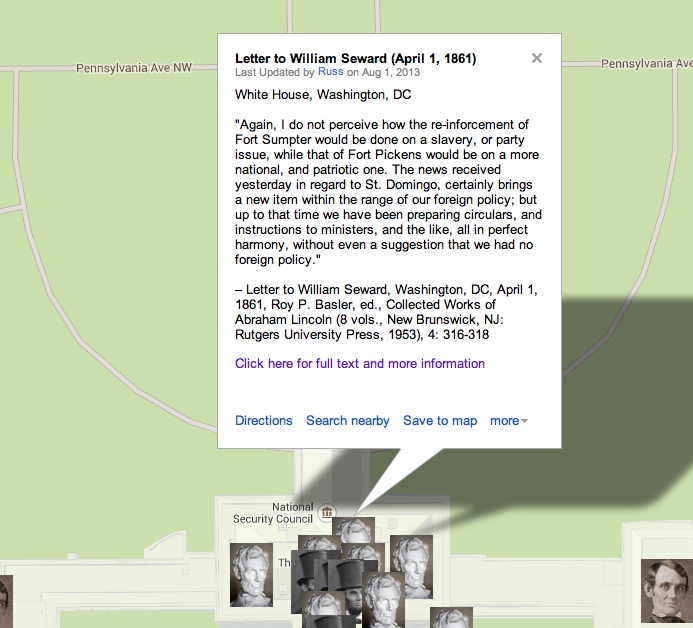Contributing editors for this page include Moyra Schauffler
Ranking
#56 on the list of 150 Most Teachable Lincoln Documents
Annotated Transcript
On This Date
HD Daily Report, April 1, 1861
The Lincoln Log, April 1, 1861
Custom Map
Close Readings
Moyra Schauffler, “Lincoln Responds to Seward,” (Dickinson College, Spring 2015)
How Historians Interpret
“One of Lincoln’s greatest challenges was taming his secretary of state. ‘I can’t afford to let Seward take the first trick,’ he told Nicolay in early March. While struggling with the Fort Sumter dilemma, Lincoln had to keep the wily New Yorker, who presumed he would serve as the Grand Vizier of the administration, from taking not just the first trick but the entire rubber. Seward hoped to dominate Lincoln just as he had dominated President Zachary Taylor. Seward evidently wished the motto of the administration to be, ‘The King reigns, but does not govern.’ He told a European diplomat that there ‘exists no great difference between an elected president of the United States and a hereditary monarch. The latter is called to the throne through the accident of birth, the former through the chances which make his election possible. The actual direction of public affairs belongs to the leader of the ruling party here just as in a hereditary principality.’ The New Yorker considered himself, not Lincoln, the ‘leader of the ruling party.’ In his own eyes, he was a responsible, knowledgeable, veteran statesman who must guide the naïve, inexperienced Illinoisan toward sensible appointments and policies. Unlike Lincoln, he did not believe that the new administration had to carry out the Republicans’ Chicago platform.”
–Michael Burlingame, Abraham Lincoln: A Life (2 volumes, originally published by Johns Hopkins University Press, 2008) Unedited Manuscript by Chapter, Lincoln Studies Center, Volume 2, Chapter 22 (PDF), 2327-2328.
“Throughout the war years, Seward, while remaining a faithful subordinate to Lincoln, enjoyed the President’s complete confidence. If Seward was in any sense a prime minister, it was because the chief executive desired him to play that role. Yet a myth persists to the contrary.”
— Norman B. Ferris, “Lincoln and Seward in Civil War Diplomacy: Their Relationship at the Outset Reexamined,” Journal of the Abraham Lincoln Association 12, no. 1 (1991), 21-42.
NOTE TO READERS
This page is under construction and will be developed further by students in the new “Understanding Lincoln” online course sponsored by the House Divided Project at Dickinson College and the Gilder Lehrman Institute of American History. To find out more about the course and to see some of our videotaped class sessions, including virtual field trips to Ford’s Theatre and Gettysburg, please visit our Livestream page at http://new.livestream.com/gilderlehrman/lincoln

